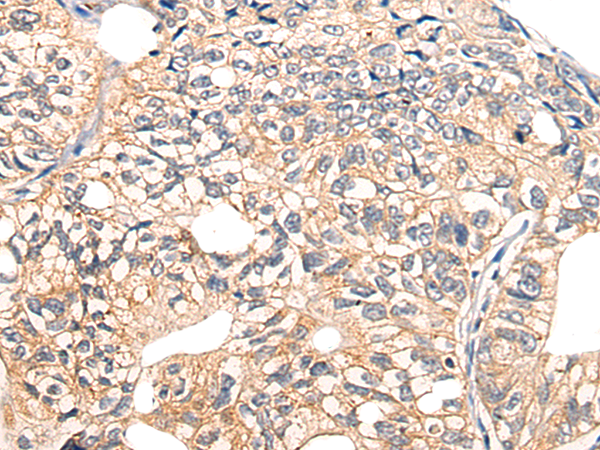
| WB | 咨询技术 | Human,Mouse,Rat |
| IF | 咨询技术 | Human,Mouse,Rat |
| IHC | 1/20-1/100 | Human,Mouse,Rat |
| ICC | 技术咨询 | Human,Mouse,Rat |
| FCM | 咨询技术 | Human,Mouse,Rat |
| Elisa | 1/5000-1/10000 | Human,Mouse,Rat |
| Aliases | TIM3; CD366; KIM-3; TIMD3; Tim-3; TIMD-3; HAVcr-2 |
| Host/Isotype | Rabbit IgG |
| Antibody Type | Primary antibody |
| Storage | Store at 4°C short term. Aliquot and store at -20°C long term. Avoid freeze/thaw cycles. |
| Species Reactivity | Human |
| Immunogen | Synthetic peptide of human HAVCR2 |
| Formulation | Purified antibody in PBS with 0.05% sodium azide and 50% glycerol. |
+ +
以下是关于HAVCR2(TIM-3)抗体的3篇代表性文献的简要信息:
1. **文献名称**:**"Targeting Tim-3 and PD-1 pathways to reverse T cell exhaustion and restore anti-tumor immunity"**
**作者**:Sakuishi K, et al.
**摘要概述**:该研究揭示了TIM-3在肿瘤微环境中与PD-1协同作用导致T细胞耗竭的机制。使用抗TIM-3抗体联合抗PD-1治疗可显著恢复T细胞功能,增强小鼠模型的抗肿瘤免疫反应,为联合免疫治疗提供了实验依据。
2. **文献名称**:**"TIM-3 in cancer; prognostic and therapeutic implications"**
**作者**:Anderson AC, et al.
**摘要概述**:文章系统综述了TIM-3在多种癌症中的表达及其与患者预后的关联,探讨了抗TIM-3抗体通过阻断免疫抑制信号通路激活抗肿瘤免疫的潜力,并强调了其在临床试验中的开发前景。
3. **文献名称**:**"Anti-TIM-3 antibody promotes T cell IFN-γ-mediated antitumor immunity and suppresses established tumors"**
**作者**:Ngiow SF, et al.
**摘要概述**:研究发现单用抗TIM-3抗体可有效激活耗竭性T细胞,增加干扰素-γ(IFN-γ)分泌,抑制小鼠模型中实体瘤的生长,表明TIM-3单药阻断在特定肿瘤类型中具有治疗价值,并揭示了其独立于PD-1通路的独特作用机制。
HAVCR2 (Hepatitis A Virus Cellular Receptor 2), also known as TIM-3 (T cell immunoglobulin and mucin domain-containing protein 3), is an immune checkpoint molecule primarily expressed on activated T cells, regulatory T cells (Tregs), and innate immune cells like dendritic cells and macrophages. Structurally, it contains an immunoglobulin variable (IgV) domain, a mucin domain, and an intracellular tyrosine phosphorylation motif. Functionally, HAVCR2 regulates immune tolerance and homeostasis by interacting with ligands such as galectin-9. phosphatidylserine, and HMGB1. These interactions modulate T cell exhaustion, apoptosis, and cytokine secretion, thereby dampening excessive immune responses.
In pathological contexts, HAVCR2 is often overexpressed in tumor-infiltrating lymphocytes (TILs) and exhausted T cells in chronic infections (e.g., HIV, hepatitis) or cancers, contributing to immune evasion. Targeting HAVCR2 with blocking antibodies has emerged as a therapeutic strategy to rejuvenate anti-tumor or anti-viral immunity. Preclinical studies show that HAVCR2 antibodies enhance T cell activation, reduce immunosuppression, and synergize with PD-1/PD-L1 inhibitors. Clinical trials are evaluating HAVCR2 antibodies in cancers like melanoma, non-small cell lung cancer, and renal cell carcinoma. However, its dual role in promoting or suppressing immunity depending on context underscores the need for precise targeting to avoid autoimmune adverse effects. Research continues to unravel its complex signaling networks and ligand diversity.
×